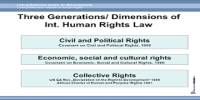Supremacy of Islamic Constitution Law
Supremacy of Shari’ah
Shari’ah the Islamic law shall have the supreme position in an Islamic Constitution. Islamic law shall be observed and practiced in all branches of effective due honor and respect. In other words, every citizen under Islamic constitutional government shall be abide by Islamic law does not discriminate man to man, religion to religion. Regarding observance of Shari’ah the commands of the Allah – the Lawgiver are as follows;
Q’ prophet! We put you in Shari’ah (the right way of religion). Therefore, follow it and do not follow the desire of those who do not know.
Introduction
To examine and identify the major sources of Constitutional Law under the Shariah and their import/application, to appreciate the components of the basic (primary) sources of Islamic Constitutional and Administrative Law (The Qur’an and Hadith), a brief analysis of the Quranic verses (on Constitutional /Administrative matters), prophetic traditions to be examined on constitutional and administrative related issues, general fundamental Constitutional/Administrative Principles of Islamic Law.
The Shari’ah is the core of Islam, the divinely ordained way of life for man. It is the instrument for building the Islamic socio-political order. It epitomizes ‘the legal towards which Muslims are restlessly trying to advance in quest of their destiny’.[1]
The concept of the Shari’ah is, however, widely misinterpreted, ill conceived and misunderstood, giving rise to intense feelings of fear, hostility and ridicule, not only among the opponents of Islam, but among the Westernized Muslim intellectuals as well. For them, the Shari’ah is time-bound and obsolete, reflects the ideas and the socio-political and moral attitudes of bygone ages and is out of tune with contemporary reality. Consequently, it must be modified and repealed, formulating new laws instead to cater for the new needs. Part of the antagonism towards the Shari’ah is attributable to the prejudice commonly found in Western thought which is based upon the traumatic experience of the ‘Crusades’ upon the western mind. Part of the blame must also rest with the situation presented by the forces of bigotry and conservatism among the Muslims, on the one hand, and the abuse of the Shari’ah by Muslim despots and leaders who find it expedient to espouse the cause of the Shari’ah. Hence the need for^ and the desirability of, elucidating and deepening the unde£s_tahdingof_this pivotal concept of Islam; its conceptual basis, sources, primary objectives and essential features. First, it is essential to clarify the difference in meaning among the terms Law, Shari’ah, fiqh and Islamic Law which are erroneously considered as synonymous and interchangeable.
Definition
Usul al-fiqh, or the roots of Islamic law, expound the indications and methods by which the rules of fiqh are deduced from their sources. These indications are found mainly in the Quran Sunnah, which are the principal sources of the sunnah “. The rules of fiqh are thus derived from
the Quran and Sunnah in conformity with a body or principles and methods which are collectively known as usul al-fiqa .Some writers have described usul al-fiqh as the methodology of law,]a description which is accurate but incompletes .Although the methods of interpretation and deduction are of primary concern to usul al-fiqh, the latter is not exclusively devoted to methodology. To say that usul al-fiqh is the science of the sources and methodology of the law is accurate in the sense that the Qur’an and Sunnah constitute the sources as well as the subject matter to which the methodology of usul al-fiqh is applied. The Qur’an and Sunnah themselves, however, contain very little by way of methodology, but rather provide the indications from which the rules of Shari’ah can be deduced. The methodology of usul al-fiqh really refers to methods of reasoning such as analogy (qiyas), juristic preference (ijtihad), presumption of continuity (ijtihad) and the rules of interpretation and deduction. These are designed to serve as an aid to the correct understanding of the sources and ijtihad.2[2]
Historical Background
Special rates to those who state that they are attending the Islam and Democracy conference, and who reserve before March 10, 2012. Accommodations via:
Pre-Islamic Arabia
Most of the Arabian Peninsula remained outside the direct control of these two world powers. The predominance of vast barren desert, alleviated only by a few water sources where agricultural communities gathered, such as Ta’if and Yathrib, made complete colonization unattractive. Nevertheless, both empires competed to establish alliances with tribes via barter and bribery as they tried to control trade routes. Competitive efforts from both Empires focused particularly on Yemen in the South. There agriculture thrived due to an ancient irrigation system of large water tunnels in the mountains, and dams, the most impressive of which was known as the Ma’rib Dam, built ca. 700 BCE. The ancient states of Saba, Ma’in, Qataban, Hadhramaut, Awsan, and Himyar evolved in this region, thanks to the cultivation and trade of spices and aromatics, including frankincense and myrrh, highly valued by the surrounding cultures. The Mar’rib Dam collapsed in AD 570. This is noted in the Qur’an and the consequent failure of the irrigation system provoked the migration of up to 50,000 people, who were forced to survive the harsh environment, taking refuge with other tribes as they were able.
The sixth century saw Bedouin tribes on well-saddled camels employed by foreign merchants to transport goods and guide caravans from one well to another by direct route across the steppes. Thus goods from India, East Africa, Yemen and Bahrain traveled on to both Byzantium and Syria.
Nomadic (badawah) life was harsh. Scarce resources meant that survival depended upon close-knit family and kinship groups or “tribes.” Too few resources led to endless battles with other tribes for water, pastureland and grazing rights. A tribe’s sheep, goats, horses, camels and slaves were under constant threat from an acquisition raid, or ghazu. The ghazu was a form of negative reciprocity and an accepted part of life necessitated by the fact that there was simply not enough to go around, particularly when water holes dried up and all food sources failed. These kinds of raids had become endemic during the century preceding Mohammad’s revelation, and often escalated from quarrels into decades of warfare between tribes. The Days of al-Fijar in which the Quraysh and the Kinanah opposed the Hawazin is an example of this, and the young Mohammad, who was a member of the Quraysh from the distinguished clan of Hashim, is said to have participated.
To be successful a tribe needed members who would not be defeated by the overwhelming harshness of life in the arid desert. As a consequence each tribe’s life and culture evolved around a chivalric code (muruwah) that was an attempt to overcome life’s severe conditions, give meaning to the Arab’s world and prevent people from giving in to despair. “Muruwah meant courage, patience, endurance; it consisted of a dedicated determination to avenge any wrong done to the group, to protect its weaker members, and defy its enemies. To preserve the honor of the tribe, each member had to be ready to leap to the defense of his kinsmen at a moment’s notice and to obey his chief without question. Above all, a tribesman had to be generous and share his livestock and food. A truly noble Bedouin would take no heed for the morrow, showing by his lavish gifts and hospitality that he valued his fellow tribesmen more than his possessions…. ” (Muhammad A Prophet of our Time, Karen Armstrong) Struggle was glorious, arrogance a sign of nobility and humility a sign of weakness.
Within the tribe the Law of Retribution was arbitrated and administered by the chief, or Sheykh: injured parties could claim retribution – an act of aggression would be avenged in equal terms – the killing of a neighbor’s son or camel meant the execution of one’s own son or camel. To facilitate retribution a “blood money” value was set for everything: individuals, goods and assets.
In an age where outside the tribe the individual was totally vulnerable, it was the idea of hospitality that enabled travel through tribal territories. “Arabian tribesmen view hospitality as a sacred duty; the pagan poets of the Jahiliya praised it as a cardinal virtue and archetyped it in the celebrated legend of Hatim al-Ta’I. Elaborate rules governed the granting and termination of hospitality to persons outside the lineage, doubtless in response to the functional significance of the traveller.” In his book “The Places Where Men Pray Together: Cities in Islamic Lands Seventh Through Tenth Centuries,” the scholar Paul Wheatley goes on to say that providing protection and safe conduct to strangers displayed the authority of the Sheykh and his tribe and confirmed their control over the territory.
By the end of the sixth century the weakness of murabah was apparent: each tribe had its own inherited rules, many of which led to reckless and extreme behavior. By this time, too, Yemen had become a province of Persia. With no hope of anything better the Bedouin saw themselves in a life of struggle, relieved only by moments of pleasure, often taken in the oblivion of date wine, and constantly open to exploitation by the two Empires. There was thought to be nothing wrong with stealing, injuring or murdering people outside one’s own tribe, so peace depended on a fragile stability created through alliances and affiliations between tribes. This depended more on the threat of retaliation and the comparative strength of each than on anything else. One can imagine that many tribes’ members, especially the weak, the old, women and children, lived in constant terror. Chaos was spreading all over the Arab Peninsula. Incessant ghazu raids now led to what seemed to be a constant state of warfare between tribes, a condition that was exacerbated by unprecedented drought and famine.
A state of mind prevailed that the Prophet Mohammad called jahiliyyah, which, according to Karen Armstrong, translates as: “violent and explosive irascibility, arrogance, tribal chauvinism.” This same word would later be understood to mean the pre-Islamic historical period itself, translated as “The Time of Ignorance.”
The Quraysh had been in control of Mecca (Makkah) since the fourth century. In the middle of the Hijaz, a region in the west of present-day Saudi Arabia, it had become a major commercial center at the crossroads of trade caravans linking Arabia with India, Persia, China, and Byzantium, and had its own Red Sea port at Shu‘ayba. Unlike other tribal settlements developed around water sources, Mecca’s stony infertile ground made agriculture impossible, so survival centered around commerce. During the last years of the sixth century the Quraysh had become extremely successful at this, but by the mid-seventh century ruthless capitalism had eroded their traditional egalitarian way of life. Quraysh society was now stratified, with its wealth confined to a few ruling families; the weaker, poorer, marginalized clans and individuals were left, lost and disoriented on the outside.3[3]
“For all their differences, the Byzantine and Sasanian Empires shared certain common features and faced similar challenges. Their rulers struggled to unify vast domains and fragmented populations by the use of force, when necessary, and by recourse to a religious ideology that they tried to impose on their subjects, which bolstered their claim to rule. Both, perhaps inadvertently, fostered movements with egalitarian tendencies that used religious ideas to blunt the harshness of existing social norms. Both faced the challenge of warding off external enemies on their frontiers … Above all the two empires faced the challenge of each other. … At stake was not merely Byzantine versus Sasanian political control and economic influence, but also Christianity as opposed to Zoroastrianism and Hellenic as opposed to Iranian cultural traditions.” (Muhammad and the Believers, Fred M. Donner.)
From their capital, Constantinople, the Byzantine emperors of the sixth century envisioned and attempted a Christianized form of the Roman world order. But this dream proved impossible as pagans, Jews, and Samaritans resisted Christianity. Within Christianity itself sharp divisions arose, particularly about the human and/or divine nature of Jesus that set one group against another. Ascetic movements: monasteries, convents, pilgrimages, saint worship, icons, relics and new forms of liturgy affected the religious mood of the Empire and a widespread appeal of apocalyptic ideas predicting the end of days ran rampant.
The History of Mohammad (Sm)
The name Mohammad in traditional Thuluth calligraphy by the hand of Hattat Aziz Efendi.
Less than one hundred years after Mohammad’s death in 632 the first Muslim historians began to write about his life. These were Muhammad ibn Ishaq (d. 767), Muhammad ibn ‘Umar al-Waqidi (d. c. 820); Muhammad ibn Sa’d (d. 845); and Abu Jarir at-Tabari (d. 923). These scholars reconstructed their narrative from oral traditions and early documents, and through their effort we know more about Mohammad than we do any other Prophet.
Source of Shari’ah
Sources of the Shari’ah
The distinction made between the terms shari’ah and fiqh suggests that the sources of Islamic law can be discussed under two categories: the primary and the secondary.
The primary sources
The primary sources of the Shari’ah include the Qur’an and the Sunnah. These two constitute the foundation as well as the essence of Shari’ah. ‘I leave two things for you’, said the Prophet (SAAS) in his farewell address, ‘you will never go astray while holding them firmly: the Book of Allah and the Sunnah of His Prophet.
The Qur’an is the principal source of the Shari’ah. It is literally the word of Allah (SWT), purely divine, incomparable and inimitable. It was revealed in a piecemeal fashion to facilitate the understanding of the text, appreciate its relevance, implant gradually but firmly its norms and to smooth the path of its implementation. The revealed book was preserved, word for word, in its complete and original form to serve as a source of guidance for all times. It provides a general theoretical framework for Islam, containing universal particular rules, principles, exhortations and commandments which are manifest, sublime (‘all) and blessed. Being divine, it is sacred, eternal, unconditionally binding, and irrevocable for the faithful.
He who follows my guidance shall not go astray, nor shall he be un-prosperous. But whosoever turns away from my remembrance, his shall be a life of narrow scope, and on the Resurrection Day, We shall raise him blind. (Al-Qur’an, 20:123-4)
The Qur’an is definitive as well as final and authoritative as a Sunna whole and in its detail, the Sunnah is neither definitive nor final or authoritative in its detail, but must be taken as a whole. There are three possible relations of the Sunnah to the Qur’an. The first is where the Sunnah agrees with the Qur’an in all respects, and in this case, the two corroborate and reinforce the given point. The second is where the Sunnah explains and illustrates the Qur’an and the third is where the Sunnah legislates on a matter on which the Qur’an is silent. No other possibilities exist for the Sunnah can never run counter to the Qur’an.[4]
The Sunnah derives its authority from the Qur’an which calls Prophet Muhammad ($AAS) the inspired Prophet (63:3-4). He was entrusted with the Holy Scripture (the Qur’an) and the message (Islam). The Qur’an calls him the interpreter and preceptor of the Qur’an (16:44), the teacher and the guide (3:48), the ruler, the legislator and the judge (44:59) and the ‘ideal role model’ to be emulated by the believers. The Sunnah, is the practical manifestation of tawhid and is fully grounded in the eternal virtues of the Qur’an. Therefore, the Qur’an declares: ‘whosoever obeys the Messenger, he has indeed obeyed Allah’ (4:80) and the Prophet (SAAS) confirmed by saying: ‘whoever followed me followed Allah, and whoever disobeyed me disobeyed Allah’.
Clearly, Allah’s commandments and directives have been bequeathed to mankind in two forms: the Qur’an, and the Sunnah, the ideal conduct of the Prophet (SAAS). The Sunnah is better seen not as ‘another’ source but as an explanation and detailed elaboration, through words and deeds, of the general principles enshrined in the Qur’an. The Qur’an is the soul, the Sunnah the body; the former provides the norms, the latter explains and practicalises these norms. The two taken together constitute the supreme law of the real sovereign known in Islamic terminology as the Shari’ah.
The secondary sources
The secondary sources of the Shari’ah include all those methods and procedures employed by Muslim jurists and scholars to comprehend and operationalise the Divine Will as contained in the Qur’an and the Sunnah. Contemporary scholars consider these as part of the all-encompassing concept of ijtihad.
Ijtihad, literally means ‘effort, exertion or endeavor’ but technically it signifies exerting the utmost effort to ascertain the injunctions of Islam and its intent through the efficient use of jurisprudential evidences (adillah) and principles (qawa’id). Mohammad Iqbal defined it as exerting one’s self ‘with’a view to form an independent judgment on a legal question’. The decisions arrived at through ijtihad should neither contravene the Shari’ah nor ‘distort its brilliant clarity’ and it should be resorted to only in the absence of an applicable text of the Qur’an or the Sunnah. Epistemologically, ijtihad involves both induction and deduction to the extent that it uses the existing body of knowledge (i.e, the Qur’an and the Sunnah) and pure logical reasoning. It presupposes an ultimate agreement between reason and revelation with the provision that the former is subservient to the latter.[5]
Ijtihad, if exercised loosely, may result in a wide variety of opinions. The jurists, therefore, developed another method as a restrictive tool on the exercise of ijtihad. This is known as qiyas (analogical reasoning), i.e., the method of extending the legal injunction found in the divine sources regarding one case to the parallel cases. The jurists of different schools have developed various other principles for establishing a new law when the text is silent on a particular matter. These include the legist’s adoption of a course which he considers better than the one suggested by the analogy (qiyas) of the fixed, legal provisions. (W) Ijtihad (public good) or adoption of a course which is considered to, be in the best interest of the community.
Ijtihad (continuance or performance) or considering the continuation of a given judicial situation previously existent unless it can /be proved that it no longer exists or has been modified of a particular society which conform to the Shari’ah.
Essential Features of the Shari’ah
The foregoing discussion on the nature and sources of Shari’ah makes it possible to delineate some of its essential features. The example of divergent thinking given above justifies the need for such an elucidation to help clearly understand and appreciate the significance of Shari’ah. To begin with, first, the Shari’ah is divine. It is the Divine will of Allah (SWT) revealed to the last Prophet of Islam (SAAS). Basically,
It rests on the authority of divine sources, i.e., the Qur’an and the Sunnah. Stated differently, the source of the Shari’ah is Allah (SWT) ‘Who has created the heaven and the earth …. Verily, to Him belong the creation and the sovereignty’ (Al-Qur’an, 7:54). To Him alone, therefore, as his only Lord and Master, man must submit his entire being. Since Allah (SWT), in addition to being Omnipotent, is Omniscient, human actions are judged according to intentions. This being the important feature of the Shari’ah, the believer in Islam is required to observe it with sincerity and good faith. Therefore, the Law, as Ibraheem Sulaiman puts it, ‘is a “Believer’s Law” in the sense that it is binding primarily on those who believe in it’. It rests, therefore, on faith or conviction. Being divine, the Shari’ah is eternal and just, designed for all times and all climes.
Vgepond, the Shari’ah is primarily normative rather than prescriptive. It is a set of value-oriented guidelines expressing the divine purposes of Allah (SWT). It offers a set of values and standards of behaviour with the object of creating that standard of character which takes pleasure in rendering service to humanity. The basic motives of civilized society such as the creation of a moral frame of mind capable of discerning virtue and vice; compassion for the weak, the deprived and the helpless; fairness in commercial transactions; protection of women against all types of exploitation; incorruptibility in the administration of justice; governing through mutual consultation and the holy texts, etc., are enjoined upon man. Intoxicants, riba (usury or interest), gambling and similar acts are forbidden. The objective of the Shari’ah is to relieve people of hardships by providing necessities of life, conveniences and luxuries or refinements. It aims at ordering the individual and collective life on the basis of virtues or ma’rafat and to purge humanity of vices or munkirat (Al-Qur’an, 3:104). Consequently, all acts are categorized into two: halal and haram, each having several gradations. In fact, the Shari’ah divides the code of behaviour and conduct, its moral quotient, into five categories: the mandatory (fard and wajib), the recommendatory but not enjoined (mandub), indifferent hence permissible (mubdh), the reprehensible but not prohibited (makruh), and the prohibited (haram).71 Reflecting the varying levels of moral demand placed on human acts, these norms and rules help shape the society in a way conducive to the unfettered growth of righteousness and truth in every sphere of human activity. Since the Shari’ah deals with value-judgements and principles, its commands can be applied to innumerable human and social conditions with precision and flexibility.
The Shari’ah in the Muslim World
Shari’ah is the core of Islam. It is the chief arbitrator of all norms, actions and policies and the defining element of an Islamic political order. Yet, the Shari’ah has been forgotten or neglected by Muslims for most of their history since the days of the rashidun caliphs. During the period of al-khulafd’ al-Rdshidiin, Sharl’ah enjoyed the position as the pivot of Muslim civilisation. The caliphs saw to it that Islamic law was faithfully administered and obeyed. The reality of government over the many centuries thereafter bore little relation to these ideal models. The Umayyad and the Abbasid caliphs sought to compensate for this gap by associating themselves with symbols of Islamic legitimacy and to bolster their prestige by patronage of Islamic institutions and services to the Islamic cause. The post facto acceptance by many Muslim jurists of the dynastic rule and its later rationalizations under the doctrine of necessity meant that political authority slowly slipped out of the purview of the Shari’ah. It was a logical culmination of this bifurcation that the colonial powers found it easy to relegate Shari’ah to a very limited sphere and supplant it with the law of their own making.[6]
Under the policies of Austin’s imperative theory, European codes of Civil Law were introduced into legal, procedural and judicial affairs. In French possessions, the Code Napoleon and in those of the English the Common Law were introduced and codified and made law for the Muslims. A new national legal system was developed in each Muslim area; lest the religious susceptibilities of the people may be offended, the law relating to family affairs was left largely intact.41
The emergence of Muslim nation-states after the Second World War did not improve the matter. The established trend has been the Westernizations of the legal system and confinement of the Shari’ah to matters of personal status, and that, too, with drastic modifications or reforms. Turkey has for long replaced the Shari’ah with a non-Islamic legal system in to. Others have relegated the realm of the Shari’ah to distorted versions of personal law maintaining in force the criminal and general civil laws based upon European models. Countries like Saudi Arabia and the peninsular Emirates, though they concede the Shari’ah to be the law of the land, permit practices contrary to the spirit of Islam. In the dominant judgment of the Islamic ally committed scholars, emirates and monarchies do not represent the style of government demanded by the Shari’ah. Iran, under the late Ayatollah Khomeini, tried to overhaul the common laws to conform to the comprehensive version of the Shari’ah. The hostile external forces and the critical shortage of manpower militated against her attempts at operational sing the Shari’ah. Thus, there exists not a single Islamic republic which may be ac-knowledge as representing a model of Islamic governance in the sense of a government constituted according to Islamic requirements. The only visible gain made by the on-going global demand for the implementation of Shari’ah is the insertion of Islam as a ‘state religion’ clause in some of the constitutions of the Muslim world and constitutional provisions indicating that the Shari’ah is either ‘a source’ or ‘the source’ of all legislation in about 26 Muslim countries. It may be noted that the Shari’ah does not have any provision requiring that Islam be designated as the state religion or that Shari’ah be the source of legislation. An Islamic constitution ipso facto implies the supremacy of Islam and the Shari’ah and hence any such designation is not merely tautological but actually uncalled for. The idea of a ‘state religion’ is a European formulation and has been imported into the Muslim land to provide an Islamic cover to the existing secular constitutions..
Implementation of Shari’ah is not a matter of getting away with cosmetic change and minor adjustments in the existing secular structures. It entails a total readjustment of social and political machineries as well as of directions in legislative thinking and procedures to conform to Islamic way of life. It calls for the mobilization of the entire community to dethrone the alien mode of thinking and living, to put an end to political and cultural imperialism and to inculcate Islamic values in order to usher in an Islamic socio-political order.
Conventional Constitutional Law
The Constitution of Bangladesh
The supreme law of Bangladesh. It declares Bangladesh as a secular democratic republic where sovereignty belongs to the people;[1] and lays down the framework defining fundamental political principles of the state and spells out the fundamental rights of citizens. Passed by the Constituent Assembly of Bangladesh on November 4,1972, it came into effect from that day. The constitution proclaims nationalism, democracy, socialism and secularity as the fundamental principles of the Bangladeshi republic. When adopted in 1972, it was one of the most liberal constitutions of the time.
The preamble to the Constitution of Bangladesh is the introductory statement that sets out the guiding purpose and principles of the document. The preamble is not an integral part of the constitution in the sense that it is enforceable in a court of law.
We, the people of Bangladesh, having proclaimed our Independence on the 26th day of March, 1971 and through a historic struggle for national liberation, established the independent, sovereign People’s Republic of Bangladesh.
Pledging that the high ideals of nationalism, democracy, socialism and secularity, which inspired our heroic people to dedicate themselves to, and our brave martyrs to sacrifice their lives in the struggle for national liberation, shall be fundamental principles of the Constitution.[7]
Further pledging that it shall be a fundamental aim of the State to realise Islam through the democratic process, a socialist society free from exploitation, a society in which the rule of law, fundamental human rights and freedoms, equality and justice, political, economic and social, will be secured for all citizens & Islam.
Affirming that it is our sacred duty to safeguard, protect and defend this Constitution and to maintain its supremacy as the embodiment of the will of the people of Bangladesh so that we may prosper in freedom and may make our full contribution towards international peace and co-operation in keeping with the progressive aspirations of mankind.
In our Constituent Assembly, this eighteenth day of Kartick, 1379 B.S corresponding to the fourth day of November, 1972 A.D., do hereby adopt, enact and give to ourselves this Constitution.
Constitution of the United States of America
America’s Second National Constitution, Purposes of the U.S. Constitution, Legislative Branch of the U.S, National Government, National Legislative Power, Separation of Powers, Checks & Balances, Legislative Bicameralism, U.S. House of Representatives, U.S. Senate, Legislative Representation, Congressional Elections, Terms of Representatives & Senators, National Legislative Process, Powers of Congress, Powers Denied to Congress, Reserved Powers of the States, Powers Denied to the States, Executive Branch of the U.S. National Government, Nature & Scope of Presidential Power, Powers & Duties of the President, Election of the President, Electoral College, Presidential Terms, Judicial Branch of the U.S. National Government, Judicial Power, Jurisdiction of the U.S. Courts, Selection of Federal Judges, Judicial Tenure, Interstate Relations, Constitutional Amendments, Supreme Law of the Land, Constitutional Rights & Liberties, Right to Vote.[8]
American Constitutional Law
Constitution of the United States of America With Commentary & Annotations
U.S. Supreme Court Decisions Interpreting the U.S. Constitution; American Federalism; Constitutional Division of Governing Authority between the National Government & the States; National Authority under the U.S. Constitution; Powers of the U.S. Congress; Enumerated Powers; Implied Powers; Inherent Powers; Powers & Duties of the American President; War Powers; Power to Make & Enforce American Foreign Policy; Treaty-Making Power; National Security; Internal Security; Powers of the U.S. Courts; Power of the Supreme Court to Interpret the U.S. Constitution; the Supreme Court’s power of Judicial Review; State Autonomy; Authority of the States under the U.S. Constitution; Reserved Powers of the States; State Police Power; Concurrent Powers; Separation of Powers in the National Government; Legislative, Executive, & Judicial Branches of Government; Checks & Balances; Individual Rights; Civil Liberties; Due Process of Law; Criminal Court Procedure; Equal Protection of the Laws; Private Property Rights & Eminent Domain; Religious Liberty & Political Rights.
Iranian Government & Constitution
The Constitution of Islamic Republic of Iran. In the name of God, the compassionate, the merciful.
We have sent Our apostles with veritable signs and brought down with them scriptures and the scales of justice, so that men might conduct themselves with fairness”. [quotations from the KORAN; English translation by N.J. Dawood]
The Constitution of the Islamic Republic of Iran sets forth the cultural, social, political and economic institutions of the people of Iran, based on Islamic principles and rules, and reflecting the fundamental desires of the Islamic people. The essence of the great Islamic Revolution of Iran, and the course of the struggle of the Muslim people from its beginning to its victory, as manifested by the categorical and striking slogans used by all classes of the people, get their special character from this fundamental desire. Now our nation, with the whole of its being is in the vanguard of this great victory, and strives for the attainment of that desire.
The Community of Believers
Just as the first followers of Jesus did not think of themselves as part of a new religion, the original community around Mohammad did not either, but rather one akin to the Hanifs – they sought the pure form of monotheism and called themselves the “Believers” (mu’minum). Allah was the God of the Jews and the Christians. According to Prof. Donner, the Qur’an uses minimum to describe the early community around Mohammad far more frequently than it does the term Muslim. “A number of Qur’anic passages make it clear that the word mu’min and muslim, although evidently related and sometimes applied to one and the same person, cannot be synonyms. For example, Q 49:14 states, ‘The Bedouins say: ’We Believe’ (aman-na). Say [to them]: ‘You do not Believe; but rather say, ‘we submit’ (aslam-na), for Belief has not yet entered your hearts.’” (Muhammad and the Believers) Here belief seems to mean something more advanced than “submission” (islam) which was perhaps a first step in the journey.
These Believers differentiated themselves from polytheism in all its forms. The one belief that there is only one God was crucial. Thus Christians who believed in the Trinity would be excluded: “Those who say that God is the third of three, disbelieve; there is no god but the one God …” (Q 5:73). Hence, for example, Christians from communities who had originally fled persecution in Byzantium for refusing to believe in the Trinity were certainly welcome, and we know that Jews were, too. Christians who followed the Gospels, Jews who obeyed the laws of the Torah and converts from paganism who obeyed the injunctions of the Qur’an would all be included.
This ecumenical community was perhaps easier to achieve since the majority in the community would have been illiterate, and most likely only the most basic ideas were held between them. “It is fair to assume that most of the early Believers probably knew only the most basic and general religious ideas we today can find articulated in some detail in the Qur’an. That God was one, that the Last Day was a fearful reality to come (and perhaps to come soon), that one should live righteously and with much prayer, and that Muhammad was the man who, as God’s apostle or prophet, was guiding them in these beliefs.” (Muhammad and the Believers, Fred M. Donner).
The Islamic creed (Shahadah), written in Arabic. The Shahadah is the Muslim declaration of belief in the oneness of God and acceptance of Mohammad as God’s prophet. The Sunni declaration reads: There is no god but Allah, and Mohammad is his messenger.
Constitutional Law & Political Philosophy
Selected Articles From
The Progressive Conservative, USA
Constitutionalism, Limited Government, the Rule of Law, Constitutional Limitations on Governmental Power, Constitutional Rights & Liberties, Liberty under the Law, the U.S. Constitution, the U.S. Courts, the U.S. Supreme Court, Theories of Constitutional Interpretation, Judicial Activism, Judicial Restraint, Judicial Adherence to the Text of America’s Basic Law, Original Intent of the American Founding Fathers, Clarence Thomas, Antonin Scalia, Appointment of Federal Judges, the President & the War Powers, Impeachment Proceedings, U.S. Citizenship & the Fourteenth Amerdment, the Political Philosophy Underlying the U.S. Constitution, James Madison, Social Contract Theory, John Locke, Thomas Jefferson, Conservatism, Classical Liberalism, Modern Social Liberalism.
Some Special Features of an Islamic Constitution
Administration through Consultation
The administration of the country under an Islamic constitution shall be done through mutual discussion and consultation. It means, there shall be no autocratic system or one man show to do whatever he likes or in whatever way he thinks fit to be followed in administering the state. There shall be a system of consultation in all branches of administration.
Regarding consultation the commands of Allah is as follows:
True believers are those who harken to their Lord and establish regular prayer, who conduct their affairs by mutual consultation, who spend out of what We bestow on them for sustenance.[9]
These are the characteristics of those people of belief who avoid committing of crime and shameful deeds and those who are forgiving others even when they are angry, as mentioned in the previous ayah of the same Surah. Administration by consultation means democratic system of government that opposes autocratism. This is the paramount principle of Islamic system of government.
All Wealth Belonged to Allah
A state under Islamic Constitution believes that Allah is the owner of the wealth. He does not is it, but it is for the use of His creatures.
The citizen has proportional right to share over it. None is allowed to grasp it illegally and usurpers should not be given shelter by any one. As Allah says,
“We have sent down to you the book in truth that you may judge between them as guided by Allah, so be not an_ advocate for those who betray their trust.
Citizen Share Their Property for the Well Being of their Fellow Human Being
There are two types of wealth that are possessed by the citizen. Such as, wealth through investment and wealth through mining. In both cases, the citizen, individually and collectively, is the owner of those property. Economic prosperity of the state can be realized through mutual sharing of this property. In other words, the citizen must assist the government in paying all types of taxes that are due for the well being of the state. Assistance of the citizen to the sate is termed as the assistance in the way of Allah. As He says:
“Behold, you are those invited to spend (your wealth) in the way of Allah. But among you are those who are niggardly. But any one who are miser are so at the expense of their own soul. Allah is free of wants and it is you that are needy. If you tern back (do not share your wealth), He will substitute in your stead another people. Then they will not be like you.[10]
Based on this Quranic law, the remaining & changing of leadership is made a prerequisite on the sharing of the wealth of rich with the state as well as the poor. This is the main way of financial solvency and means of purification of soul of the citizen of that state.
Government in Structure of Islam
From the viewpoint of Islam, government does not spring from the sphere of classes or domination by individuals or groups. It crystallizes the political aspirations of a nation united in faith and thinking which provides itself with an organization so that in the process of transformation of ideas and beliefs, its way may be opened towards the ultimate goal (moving towards God). In the course of its revolutionary development our nation was cleansed from the dust and rust of idolatry, and from foreign ideological influence. It returned to true Islamic intellectual attitudes and views of the world. Now it is planning to build its new model society on such a basis, with Islamic standards. The Mission of the Constitution is to identify itself with the basic beliefs of the movement and to bring about the conditions under which the lofty and worldwide values’ of Islam will flourish.
The Constitution, having regard to the Islamic contents of the Iranian Revolution, which was a movement for the victory of all the oppressed over the arrogant, provides a basis for the continuation of that revolution both inside and outside the country. It particularly tries to do this in developing international relations with other Islamic movements and peoples, so as to prepare the way towards a united single world community (“Your community is one community, and I am your Lord who you are to worship”) Quotation from the Arabic and to the continuation of the progressive struggle for the rescue of deprived and oppressed nations throughout the world.
Constitutional Declaration & Conclusion
Comparison
Secularism, once triumphant, is now under attack. Many Muslim countries have become progressively ambivalent toward the ideals and institutions of secular society, inappropriate transplants from an alien culture with a different sense of history and values. Secularism has failed to meet the political and social needs of Muslim societies. Problems of political legitimacy and authoritarianism continue to exist. Grievous socio-economic disparities, the breakdown of traditional life pattern and a spiritual malaise characterised by widespread corruption are attributable to the blind following of a valueless social change.
To be sure, attempts at emulating the Western model of modernisation were confined to small elites which, when in power, expanded the functions and powers of the inherited nation-state and its institutions at the expense of the religion and its institutions and invariably allied themselves with foreign powers to the detriment of their respective societies. True to their education and training, they made Islam the handmaiden of the parochial nation-state, manipulated the sociopolitical institutions to the detriment of their own people and served to undermine the values, beliefs and attitudes of Muslim.
Constitutional & Declaration
- All men are the progeny of Adam and Muslims are the brethren of faith of one another. Therefore,
- Every Muslim shall live unitedly under the fold of Shari’ah.
- Every Muslim shall follow the government (of Islamic constitution) as the basis of unity and shall live with Muslim community and participate in all programs, which is meant for the promotion Islam
- Every Muslim must live with Muslim society and participate in common program like Friday prayer, ‘Id prayer etc.
- · No Muslim shall be allowed to leave Muslim society to live with non-Muslim and shall not be allowed to follow the religious rites and customs of non-Muslims.
Conclusion
Shari’ah is often misunderstood and has wrongly been equated with the law as understood by many in the West. It has been equated with fiqh or jurisprudence. The two terms, though related, are not identical: shari’ah is divine in its origin, while fiqh is a human product, outcome of attempts to understand, interpret and apply the will of Allah (SWT). The Qur’an and the Sunnah define the Divine Will, the fiqh spells out that Will and establishes the methods to derive and apply its rules to regulate individual and collective behaviour. In common usage, however, the two appear as equal parts of the Shari’ah.
Shari’ah is an entire scheme of life ordained by the Lord, the Creator, and sustainer of the Universe. Divine in its origin, the Shari’ah is largely prescriptive, comprehensive, and organically balanced in nature. It sets forth and regulates man’s relation with and obligations to Allah (SWT), to himself, to his fellow beings and to other creatures. It may narrowly be defined to imply do’s and don’ts. These commandments have always been viewed within the perspective of an entire scheme of life covering all spheres of human activity. What is presently known as Islamic law or introduced under the Islamisation programme is only part of the larger whole which has no independent existence and cannot be enforced apart from the total system to which it belongs.
Shari’ah is based on the principles of: (1) the centrality of Allah (SWT) in everything (tawhld); (2) the prophethood of Muhammad (SAAS) (risalah); (3) the vicegerency of man on earth (khilafah); and (4) the doctrine of enjoining virtue and forbidding vice (amr hi al-ma’aruf wa al-nahy’an al-munkar). Tawhid implies the unity and sovereignty of Allah (SWT) Who alone has the right to regulate man’s behaviour. Hence the revelation of the Qur’an. The appointment of the inspired prophet is a sine qua non to interpret the Qur’an and to guide the believers through his personal examples, sayings and approvals referred to as Sunnah. To derive positive rules from the Qur’an and the Sunnah and to expand their application to new situation there emerged the all-embracing concept of ijtihdd which subsumes various categories of endeavour such as ijma’, istislah, istihsan, istishab, and ‘urf.
Shari’ah, the dominant moral and legal code of Muslim societies, facilitated the social growth and development of the Muslims to such an extent that it culminated in the establishment of the geographically vast civilisation of Islam. This dynamism of the Shari’ah is largely due to the role played by Ijtihad. It is well known that the companions of the Prophet (SAAS) and the majority of scholars during the formative period of Islam, including the founders of the schools of jurisprudence (madhahib), did exercise and called for the extension of ijtihad to all qualified Muslim scholars. Soon, however, ijtihad ceased to play its role as the guiding force that inspired Muslim creativity and ingenuity and that nurtured the growing spirit of the Muslim community. Taqlid came to be the generally accepted mode of analysis. The contemporary realisation that taqlld resulted in intellectual decline, social decadence and eventual acquiescence to the Western mode of civilisation had led to a renewed call to reopen the gate of ijtihad to proceed to the work of reconstructing a dynamic, thriving civilisation of Islam.
Bibliography
List of Books
- Islamic Jurisprudence
– Imran Ansan Khan Myazee.
- Islamic law of contacts
– Dr. Mohammad Mahmud Tahir Monsori.
- Principal of Islamic Jurisprudence
– Mohammad Hashim Kamili.
- Bangladesh Constitution
– Justice Mostafa Kamal.
- Islamic Constitution, Quranic & Sunnatic Perspectives
– Dr. A.B.M Mahbubul Islam.
- Political Science Islamic Perspective –
- The Legal of Islam – A.R Motin
List of Websites
- www.supramacyhofislamicconstitutionlaw
- www.sourceofislamicconstitutionlaw
- www.perislamichistory
- americaconstitutionlaw
- irianconstitutionlaw
[1] Amidi, Ikhkam, 1, 6; Shawkani, Irshad, P.3
[2] Cf. Abu Zahara, Usul, P-6
[3] Khallaf, Ilm, P-35, Abu Zahrah, Usul, P-71, Shaltut, Al-Islam, P-498
[4] The book of Allah and the Sunnah of his prophet, P-51
[5] The Islamic Terminology as the Shari’ah, P-53
[6] The book the Islamic Legal Order, P-62
[7] The constitution of law, P-5
[8] The Political Science Islamic Perspective, P-67
[9] Al Qur’an Al Nisa, 4:105

















